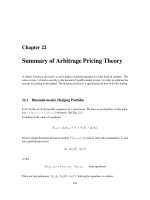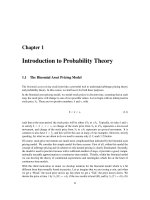Trànormation -Theory
Bạn đang xem bản rút gọn của tài liệu. Xem và tải ngay bản đầy đủ của tài liệu tại đây (151.52 KB, 14 trang )
Transformation
Structure 1.
• She’s a better tennis player than I am.
I don’t play tennis as well as she does.
• Britain isn’t as warm as Greece.
Greece is warmer than Britain.
EXAMPLE
Finish each of the following sentences in such a way that it means exactly the same as
the sentence printed before it.
• They don’t speak as fluently as we do.
We speak …………………………………………………………….
• No other city in Vietnam is so large as Ho Chi Minh city.
Ho Chi Minh city ..………………………………………………….
Structure 2.
a)
•This song is simple enough for all of us to sing.
This song is so simple that all of us can sing it.
EXAMPLE
Finish each of the following sentences in such a way that it means exactly the same as the
sentence printed before it.
• He is rich enough to buy whatever he wants.
He is ………………………………………………………….
• Richard is tall enough to change light bulbs in some rooms without
having to stand on a chair.
Richard is ………………………………………………………
b)
• The house was so expensive that my brother couldn't buy it.
The house was too expensive for my brother to buy.
EXAMPLE
Finish each of the following sentences in such a way that it means exactly the same as
the sentence printed before it.
• The water was so cold that the children could not swim in it.
The water …………………………………………………….
• He was so tired that he couldn't stay awake until the end of the film.
He was ……………………………………………………….
Structure 3.
• It’s wonderful to lie on the beach all day.
To lie on the beach all day is wonderful.
EXAMPLE
Finish each of the following sentences in such a way that it means exactly the same as
the sentence printed before it.
• It’s difficult to understand what she’s talking about.
To understand……………………………………………………
• It is very relaxing to spend a day in the country.
To spend…………………………………………………………
Structure 4.
Ex:
• I advise you not to see her again.
You’d better not see her again.
• You’d better think carefully before accepting the offer.
I advise you to think carefully before accepting the offer.
EXAMPLE
Finish each of the following sentences in such a way that it means exactly the same as the
sentence printed before it.
• I don’t think you should drink any more coffee.
You'd better ………………………………………………………….
• You had better begin by introducing yourself.
I advise……………………………………………………………….
Structure 5.
• He’d rather watch TV than go out to the cinema.
He prefers watching TV to going out to the cinema.
EXAMPLE
Finish each of the following sentences in such a way that it means exactly the same as the
sentence printed before it.
• Alice would rather drink Coca-Cola than orange juice.
Alice prefers………………………………………………………….
• Jane would prefer to go to class tomorrow than today.
Jane would rather…………………………………………………….
Structure 6.
• He started working here three years ago.
He has worked here for three years.
EXAMPLE
Finish each of the following sentences in such a way that it means exactly the same as the
sentence printed before it.
• She last saw him when she was ten.
She hasn’t………………………………………………………
• The last time Jack went swimming was five years ago.
Jack hasn’t………………………………………………………
Structure 7.
• I can't see the play because it is sold out.
If the play were not sold out, I could see it.
• We didn't go on holiday because we didn’t have enough money.
If we had had enough money we would have gone on holiday.
EXAMPLE
Finish each of the following sentences in such a way that it means exactly the same as
the sentence printed before it.
• My brother didn't buy that car because he didn't have enough money.
If my brother……………………………………………………
• He smokes too much; perhaps that's why he can't get rid of his cough.
If he didn’t smoke……………………………………………
Structure 8.
• She said, "The school opened a year ago."
She said the school had opened a year ago.
• 'You must wear a tie,' the teacher said.
The teacher told him he had to wear a tie.
Notes:
• Changes in tenses
Direct speech Indirect speech
Simple Present
Present Progressive
Simple Past
Present Perfect
**
Past Progressive
Simple Future (will + v)
Future Perfect (will have + v)
Present Conditional (would + v)
Simple Past
Past Progressive
Past Perfect
Past Perfect
**
Past Perfect Progressive
Present Conditional (would + v)
Perfect Conditional (would have +v)
Perfect Conditional (would have + v)
•
Changes in time and place
Direct speech Indirect speech
today
tonight
yesterday
the day before yesterday
tomorrow
the day after tomorrow
last week / year, etc
next week/year, etc
a year ago
these
come here
that day
that night
the day before / earlier
two days before
the next / following day
in two days’ time
the previous week/year, etc
the following week/year, etc
the previous year/ a year before
those
go there
a)
• The teacher said to us: “Did you understand my instructions?”
The teacher asked us if (whether) we had understood his instructions.
EXAMPLE
Finish each of the following sentences in such a way that it means exactly the same as
the sentence printed before it.
• Tom said, “Can you remember where you put the dictionary, Mary? ”
Tom asked……………………………………………………
• My brother said to her, "Did you see George at the football match?"
My brother asked..……………………………………………
b)
• I said to her: “What do you mean?”
I asked her what she meant.
EXAMPLE
Finish each of the following sentences in such a way that it means exactly the same as
the sentence printed before it.
• ‘Where did you buy your shoes, Sally?’ asked Gail.
Gail asked………………………………………………………
• I said to my brother, "How much did you pay for these over ripe tomatoes?"
I asked…………………………………………………………….
c)
• He said to me: “Don’t believe everything she says”.
He told me not to believe everything she said.
EXAMPLE
Finish each of the following sentences in such a way that it means exactly the same as the
sentence printed before it.
• He said to the servant, “Please bring me some hot water".









